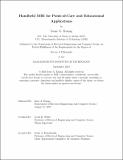Handheld MRI for Point-of-Care and Educational Applications
Author(s)
Kuang, Irene A.
DownloadThesis PDF (77.23Mb)
Advisor
White, Jacob K.
Terms of use
Metadata
Show full item recordAbstract
Magnetic Resonance Imaging (MRI) is a powerful, non-invasive imaging modality for visualizing the body’s internal anatomy and providing contrast between soft tissues. However, the reach of clinical MRI scanners is limited by their expensive infrastructure (millions of USD), including radiofrequency (RF) shielded rooms and liquid helium-cooled superconducting magnets. Permanent magnet arrays present as a lowcost and portable alternative for point-of-care and educational MR applications, while sacrificing in image quality. This work focuses on the following contributions: (1) the development of a novel magnet topology, referred to as the “spokes-and-hub” configuration, which incorporates a computationally efficient equivalent charge magnetic field analysis technique using surface charges of bar magnets arranged in oppositely polarized rings; (2) the optimization of dithered RF pulses through the utilization of a microcontroller and inexpensive hardware; (3) the design of gradient encoding fields specific to the spokes-and-hub magnet; and (4) the reconstruction of images obtained from phantoms. Finally, these contributions are summarized into a framework for the comprehensive imaging system design demonstrated in this thesis, which will also allow for future iteration, scaling, and advancement of spokes-and-hub magnet design.
Date issued
2023-09Department
Massachusetts Institute of Technology. Department of Electrical Engineering and Computer SciencePublisher
Massachusetts Institute of Technology